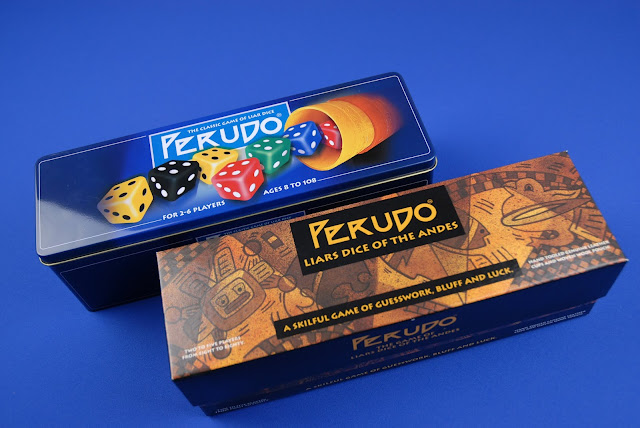Review: Council of Verona (Second Edition)
Players: 2-5
Ages: 13+
Time to play: 20 minutes
I'm digging out a bit of a classic for my next review, it's the card game Council of Verona! This little gem is a card placement game created by Michael Eskue which was released by Crash games in 2013. Sadly, Crash games ceased trading in 2017 for various reasons but but during their time they did create a number of really solid and well received games. Council of Verona was one of their most popular titles featuring on the hallowed (and also sadly defunct) YouTube series "Tabletop" featuring Wil Wheaton.
Council of Verona is based on the the play "Romeo and Juliet" by William Shakespeare and features not only the main protagonists, but their friends and families (the Montagues and Capulets, who are sworn enemies). The game is set in Medieval Verona and see's the two families locked in a struggle for power over the ancient city.
Inside the beautifully designed box (which closes magnetically) you've got everything you need to bring your master plan into operation. A deck of 17 uniquely illustrated character cards, some agenda/action reference cards, the council and exile cards and a number of influence tokens. As this is the second edition, you also get the poison expansion included, which is effectively a couple of extra tokens and an extra rule or two.
So the game begins with the placement of the council and exile cards. Any subsequent cards placed during play will be placed under one of these cards, indicating whether they are on the council or in exile. Council cards are placed normally, but exile ones are placed on their side.
The cards are then dealt out to each player. However, this process is different according to how many players you have playing. So in a 3-5 player game, each player is dealt a random card then passes the deck around each taking a card that they want until two are left, the final player takes one and discards the other. In a 2 player game, 3 cards are initially discarded then the rest dealt out. Players keep three of the cards they have been dealt and pass the remaining two to the other player.
Although this seems an odd way to deal out, it's actually quite clever - this means that players will have some knowledge of what cards are available in the deck, so what agendas can be completed. Also there are enough blind cards dealt to keep the game interesting.
Now the cards can be basically divided into three factions, these are the Montagues (in blue) the Capulets (in red) and the Neutrals (in white), there are also a couple of cards which can count as both neutral and Capulet, and both neutral and Montague. Each of these faction cards will have either an action which can be performed or an Agenda on it (which we will get to later).
On each of the players turns, they simply place a card in either the council or exile. If it is an action card, they have the option to perform the action, if it's an agenda card then there is no action to perform. After they have placed a card they then also have the option to place a token on any of the agenda cards in play. Once all the cards are exhausted, each player has one final turn to place a token on any of the agenda cards if they wish and then the game is over.
Now the premise of the game is simple, each of the players starts the game with a number of influence tokens, which have a number on them. During the course of the game you can place a token (face down) if you wish on one of 3 spaces on the agenda card. If at the end the game that agenda is fulfilled and the statement is true, then that player wins the value of the token. Each place on the card has a score modifier on it which is also added (or subtracted) from the value of the token that you placed.
So using the "Lord Capulet" Agenda card as an example... His agenda states "More Capulets than Montagues on the Council". So at the end of the game, if there are more Capulet cards than Montague cards in the council area, his agenda will be fulfilled. The tokens which will have been placed on that card will be turned over and counted (and any score modifiers applied).
In essence you are effectively betting on the outcomes of the various agendas and gaining a reward for backing the right things. Just like the real world of shadowy medieval politics, or any politics for that matter...
Agenda cards are always concerned with the final placement of factions or individuals, whether that be keeping them together or apart. Action cards on the other hand are used only once during play at the moment they are placed, and are typically there to mess with everyone else's strategies. Actions cards will have things such as "move a character from council to exile" (or vice versa) and swap two influence tokens for example.
Now, not all of the tokens you place have values on them, and this is where you can mix the play up a bit and fool your opponents. One of the tokens is blank, so will return you nothing at the end of the game, you can use this to fool players as to what agendas you're backing.
In addition to this, as this game contains the poison expansion, you can also place a "P" and an "A" token, signifying either poison (in true Romeo and Juliet style) or an antidote. So if a character is poisoned using a token, they are removed from the game at the end, and their agenda is no longer achieved. However if that poisoned character also has an antidote token then that player is saved and the game continues as before.

So effectively you spend the game betting on agendas, which could be an agenda that you have placed or ones that others have placed. All the while shifting cards from council to exile and swapping tokens. And although that sounds simple (and strategically it is), it's actually really surprising how mentally taxing this can become.
Often you find that you have a number of viable agendas circling around in your head, but of course as action cards are placed, the landscape shifts, creating new possibilities and ruining existing strategies. Often the best strategy can be to bet on an agenda which has no hope of being fulfilled, then using an action card at the last moment to change your fortunes. But this of course relies on the no-one swapping the cards right back on their turn and snatching the victory back. So it makes good sense to know what cards are yet to be played as this has a huge bearing on how you play.
The ability to bluff with zero value tokens and poisoning characters adds an extra dynamic which can be exploited too, especially if you have an action cards which enables you to see or swap tokens.
Overall It's fair to say that the Council of Verona packs a large dagger into a very small codpiece, the game itself is simple to learn but has a lot of strategic value. Games are very short and the winning margins are very small, meaning that people are always up for a rematch.
It is fun to play, but wont keep you entertained for hours. As a filler it's excellent and it's dinky size makes it a great travelling companion. I think I managed to pick up a copy for £8 so I can't argue about it's value for money.
I'd certainly recommend this one.
You can still pick up a copy of Council of Verona here but how long this lasts I don't know. Ferti Games are still distributing the French language version of the game (Verone) but I don't know whether they have the rights to the English version or indeed if anyone does. Maybe my love affair with this little beauty is as doomed as the Romeo and Juliets.







Comments
Post a Comment